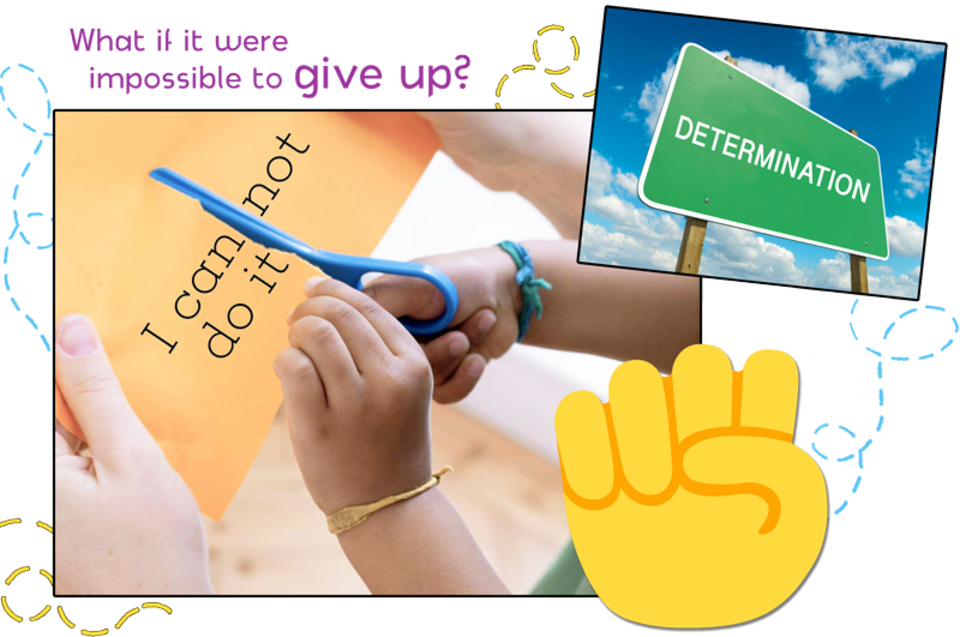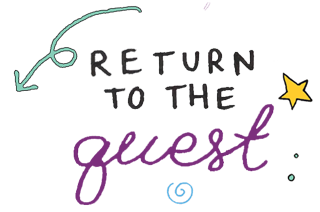
Giving up… impossible?
| Objective: To envision a completely different universe in order to reveal the hidden dimensions of the concept of giving up! |
Duration: 30 to 90 minutes
Material:
- Sheets of paper and pens
- Coloured pencils and markers
Instructions:
Thought experiment: Imagine a world where... it is impossible to give up on anything! Admitting defeat is just not an option. What would this world look like? Would it be fantastic or horrible? How would this world be different from ours? How would life change? Would you want to live in this alternate world? Why or why not?
...
- Think about the effects. As you start brainstorming, you might wonder what exactly counts as giving up. Does it mean stopping a project altogether? Abandoning hope on a dream? Resigning yourself to failure? Giving in to pressure or discouragement when things get tough? To wrap your head around this concept, think about what makes you want to give up. How do you feel in the moment? What pushes you to want to quit trying? What makes you lose heart? Now imagine that those feelings—and whatever produces them—disappear! Would the result be a world of total resilience? Try to picture a race of humans who show constant persistence, determination and resolve in the face of all obstacles! What are they like? Are they missing out on something by not experiencing defeat? Make a list of three positive and three negative points of a world where it is impossible to give up on anything, and add reasons to explain your impressions.
- Variation: Consider how this world might affect life in different contexts, such as: relationships, school, jobs, government, art, religion, the environment, etc.
- Create a character. To take your thinking one step further, think about how this alternative world might affect different people in society. What kind of jobs or situations or projects would be most impacted by the inability to give up, and why? Then, picture one thing that should never happen for real but might in a world where perseverance rules. Imagine a character who would stay completely committed to making this thing happen! What is motivating them? What do they want to accomplish? What are the consequences? Now, picture the opposite: one thing that has never happened but should—and could!—in this alternative world. What character would help make this thing happen thanks to their super resilience? And what are their motivations and goals? Describe these unique experiences… and don’t give up until you’ve offered as much detail as possible!
- Represent this world. Based on your reflections, imagine how you could represent your impressions of this alternative world—through a drawing, a collage, a diagram, a poem, or a dance. Your style can be realistic, abstract, comic, dramatic, etc. How could this world help us better understand—and even improve—our own?
...
Bonus: Have you ever tried to… bribe yourself? For example, have you promised yourself a gift or a reward if you accomplish something? A bribe is a kind of incentive—something that motivates us to act by stimulating our interest and our will power. The word “incentive” comes from the latin words incentivus and incinere, which mean to strike up a tune, to enchant and to rouse to action! Throughout history, humans have often used money and power as incentives, and sometimes acted in strange and unreliable ways as a result! But incentives also include the urge to create, to feel satisfaction from a job well done, to do the right thing, to earn the respect of others and to surpass ourselves! What gets you motivated? Make a list of three things that could act as your own incentives to not give up. Then ask yourself if incentives can make us more resilient… and whether we should need them to act. Is an action better or worse if it is motivated by an incentive? Could an incentive be good for one person and bad for another? Could an incentive be dangerous? Why or why not? |

| Tricks for tots: Pretend you are a person from this imaginary world coming to visit Earth to teach us a thing or two about not giving up! Your first client is a beaver who is feeling really discouraged about building his first dam. “It’s so much work,” he tells you with a heavy sigh. What tips could you share to help him hang in there and keep at it? Do you advise him to break down the job into little tasks? To get a team of friends together to help? To picture his home when it’s all finished? Now test out your great guidance by doing something that you normally find difficult! Did your tips help you not give up? Why or why not? |
| Tips for teens: Do you ever feel like the odds are against you? Like you have no chance of succeeding, no matter how hard you try? Like it’s beyond the bounds of possibility that you will reach your goal? And worse… do you then feel guilty about these feelings? Sometimes we get the message that being good means never quitting, like it’s a virtue to stick with it and a vice to throw in the towel. But maybe there’s a middle ground? The Greek philosopher Aristotle argued that a virtue is actually the happy medium between two vices—in this case, it might be striking the balance between persevering in vain and not even trying. Should we give up in some situations? Play with this idea by making your very own QuitList—a spin on the classic checklist. Take note of all the conditions under which quitting might be the right thing to do and why. Is it when a situation places unreasonable expectations on you, or goes against your values, or jeopardizes your mental health? Then try out being a righteous quitter to see if you can trade in that feeling of guilt for one of relief! |
Share your creative reflections by sending them via email.
Include photos of your projects and notes of your thoughts, as well as your first name and your age!


